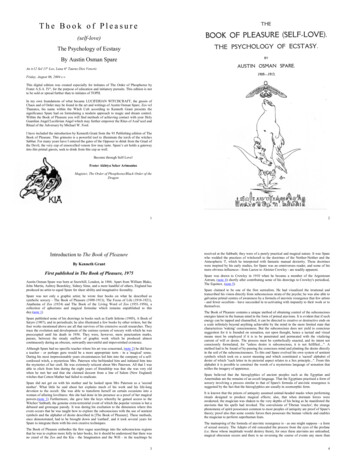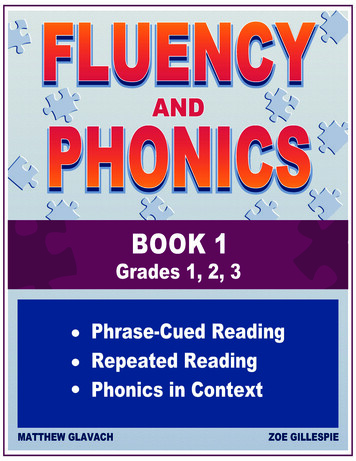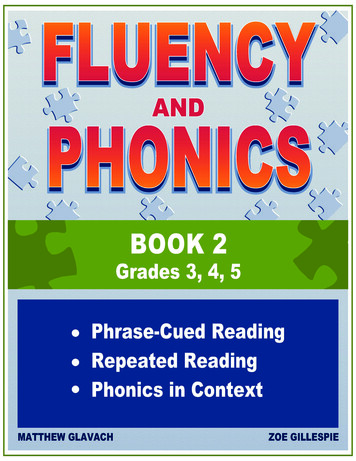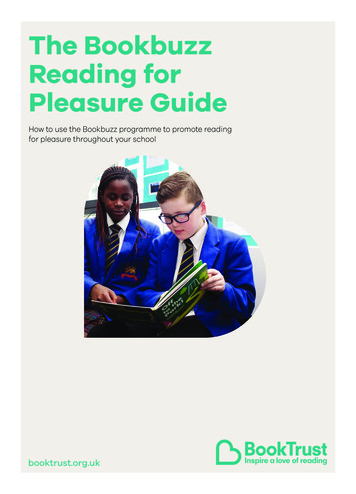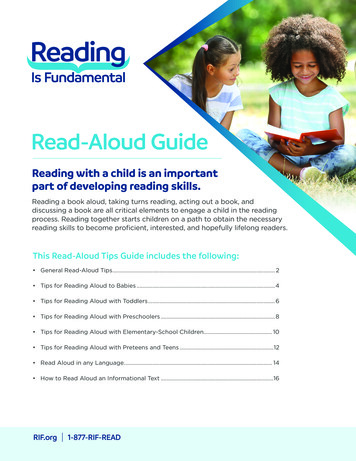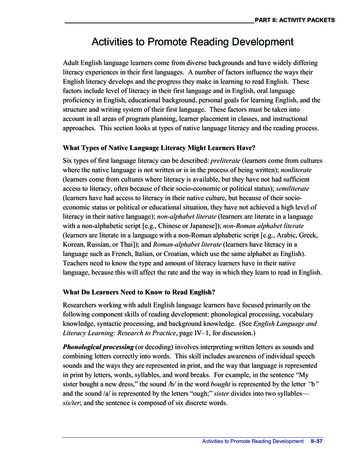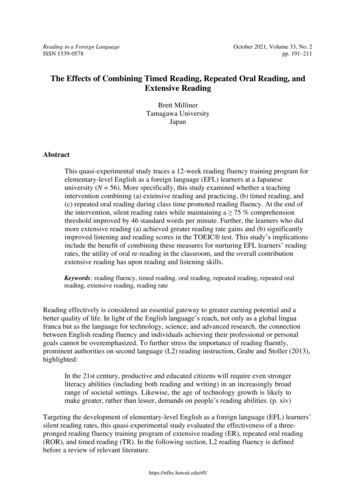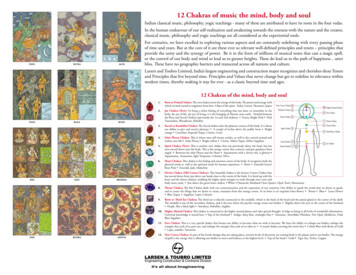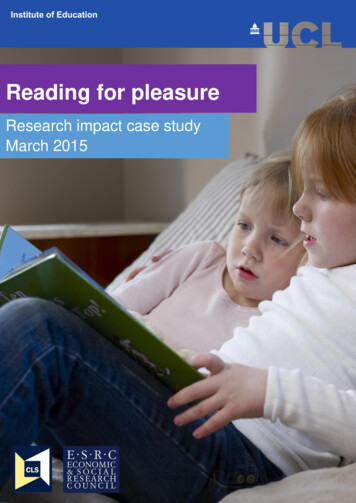
Transcription
Reading for pleasureResearch impact case studyMarch 2015
ContentsContents . 2Reading for pleasure . 3Different forms of impact . 5Policy reviews . 8Other major bodies and initiatives. 8Local authorities. 9Literacy organisations and charities. 11Libraries and library associations . 13Schools . 15United States . 19Education organisations/websites. 19Parents’ associations . 20Publishers . 20Other commercial organisations . 21Blogs and special interest websites . 22Books aimed at teachers, parents or librarians . 24Media coverage . 25Overseas coverage. 26Social media . 272
Reading for pleasureA 2013 research paper by two academics at the Centre for Longitudinal Studies on thebeneficial effects of reading for pleasure in childhood has attracted a remarkable amount ofinterest from schools, libraries and literacy organisations around the world.This case study shows how the findings have been used to help protect library services, topersuade children of all ages to spend more time reading, and to encourage parents tosupport schools’ home reading initiatives.The research has also influenced the thinking of policy-makers, educationists and localauthority administrators in not only the UK but a number of other English-speakingcountries.3
What the research discoveredThe CLS study found that children who read for pleasuremade more progress in maths, as well as vocabulary andspelling, between the ages of 10 and 16 than those whorarely read.The research, which is believed to be the first to examinethe effect of reading for pleasure on cognitive developmentover time, was conducted by Professor Alice Sullivan andMatt Brown. They analysed the reading behaviour ofapproximately 6,000 members of the 1970 British CohortStudy, which is managed by CLS and funded by theEconomic and Social Research Council. Their researchlooked at how often cohort members read for pleasureduring childhood and their test results at ages 5, 10 and16.Where the study canbe foundSullivan, A. and Brown, M.(2013) Social inequalities incognitive scores at age 16:The role of reading. CLSWorking Paper 2013/10.London: Centre forLongitudinal x?itemtype document&id 1719Perhaps surprisingly, reading for pleasure was found to be more important for children’scognitive development between ages 10 and 16 than their parents' level of education. Thecombined effect on children's progress of reading books often, going to the library regularlyand reading newspapers at 16 was four times greater than the advantage children gainedfrom having a parent with a degree.What the researchers have done to promote their findingsHigh-profile radio interviews: Professor Sullivan was interviewed by BBC Radio 4’sflagship morning radio programme, Today, on September 11, 2013.http://www.bbc.co.uk/news/education-24045371 She also gave interviews to BBC LondonTV, Sky News (radio), BBC regional stations and Al Jazeera, the Qatar-based broadcaster.Guardian article: Professor Sullivan wrote a Guardian blog about her research, which hassince been shared via social media more than 3,000 nce presentation: She also addressed the Reader Organisation’s annualconference on May 15, 2014, at the British Library in ce.aspxAbout BCS70The 1970 British Cohort Study (BCS70) follows the lives of more than 17,000 people bornin England, Scotland and Wales in a single week of 1970. Over the course of cohortmembers’ lives, BCS70 has collected information on health, physical, educational andsocial development, and economic circumstances, among other factors. Since the birthsurvey in 1970, there have been eight surveys at ages 5, 10, 16, 26, 30, 34, 38 and 42.4
Press release: The researchers, working incollaboration with CLS communications staff, alsoissued a press release on their findings, whichtriggered a huge amount of media attention. See“Reading for pleasure puts children ahead in theclassroom, study finds”, September 11, 2013http://www.ioe.ac.uk/newsEvents/89938.html (theprincipal press reports are listed below, under ‘Mediacoverage’).Different forms of impactSocial science research can have various types ofimpact beyond the world of academia. It caninfluence changes in policy or practice. Sometimes itcan even affect the behaviour of the public. Moreoften, however, such research has a conceptualimpact, changing people’s knowledge,understanding and attitudes towards certain issues.Sullivan and Brown’s findings have undoubtedly hadthe latter form of impact, as this case study willdemonstrate. But they also appear to haveinfluenced the thinking of politicians and policymakers – in the UK and other English-speakingcountries.Policy uses of the CLS studyStop Press:On the day this case study waspublished, the Department forEducation released an importantpolicy document which alsoreferred to Sullivan and Brown’sresearch -- Reading: the nextsteps. Supporting higherstandards in reading-supportinghigher-standards-in-schoolsThis document, which carries aforeword by Nick Gibb, Ministerof State for School Reform, setsout how the government willsupport schools to improvereading standards, “and promotereading for pleasure”.It cites Sullivan and Brown’s2013 study and states (see page18): “Reading for pleasure hasalso been found to be linked togreater progress in spelling andmathematics skills. Recentlongitudinal research found theimpact of reading for pleasure onprogress in vocabulary,arithmetic and spelling betweenthe ages of 10 and 16 to be fourtimes greater than the impact ofhaving a parent with a degree.”The research was highlighted in the British Labour1party’s education policy review , published in April2014. In his foreword to the report, David BlunkettMP, the former Secretary of State for Education andEmployment, said: “ stirring texts and imaginativeprogrammes of learning, which light a candle andengender a love of learning for life, must also becentral to our goals. Indeed, an Institute of Education study in autumn 2013 found thatchildren who read for pleasure perform significantly better at school in maths as well asEnglish.”There is also evidence that Sullivan and Brown’s research has helped to shape policies onreading and libraries in England, Scotland, and internationally – at either a national,regional or individual library/school level. Here are some other examples of how the findingshave been used:1Blunkett, David; Review of education structures, functions and the raising of standards for all – Puttingstudents and parents first, April 2014 (published as part of the Labour party’spolicy review process ahead of the 2015 General itor/files/130514 Report FINAL.pdf5
Australia: The research has been cited many times by schools and state governmentofficials in South Australia in order to support the Premier’s Reading Challenge, a longrunning literacy initiative. When the organisers of the Challenge announced that thescheme would focus on secondary schools in 2014 they referred to Sullivan and Brown’sfinding that reading for pleasure between ages 10 and 16 boosted all-round attainment.Canada: The National Reading Campaign draws attention to the study in its web-based‘toolkit’ for parents who want to develop their children’s interest in reading. In Vancouver,the vice-chair of the city’s library board has used the CLS research to demonstrate whypublic libraries merit public investment.England: Sullivan and Brown’s findings have fed into Arts Council England’s review of theeconomic contribution of libraries and the Department of Business, Innovation and Skillsinquiry into adult literacy and numeracy. A number of local authorities in England have alsogiven serious consideration to the research and its messages for library and school readingpolicies.New Zealand: The National Library of New Zealand has flagged up Sullivan and Brown’sfindings in its web-based guidance for teachers on how to create a reading culture in thenation’s schoolsScotland: In November 2013, Lin Anderson, chair of the UK’s 9,000-member Society ofAuthors cited the CLS findings in the first paragraph of her open letter to Edinburgh CityCouncil protesting about plans to cut school librarian posts. The council later withdrew theirplans in view of such public protests. The research also featured in a major Scottish reviewof the impact of school libraries on learning led by Professor Dorothy Williams of AberdeenBusiness School’s IMAGES Research Institute.6
United States: In Hillsboro, Oregon, the city’s library managers have chosen ‘studentsuccess’ as one of their key goals for 2014-17, explaining that Sullivan and Brown’s workshows that reading for pleasure can boost children’s all-round performance. (Furtherinformation on all of these policy-related uses of the research is provided below).Conceptual impact and influence on practiceProving conceptual impact is seldomeasy but one of the ways it can be shownis by measuring public reaction to aparticular piece of research. “How muchdiscussion have the findings generated?”“What form has this discussion taken?”The scale of the reaction to Sullivan andBrown’s findings is perhaps bestdemonstrated by one statistic – thenumber of times the press release ontheir findings has been accessed byvisitors to the UCL Institute of Educationand CLS websites. By early February2015 that total had risen to more than 75,0002. No other press release issued by CLS or theIOE in recent years has attracted that amount of attention.The initial publicity also led to CLS receiving many phone calls and emails from schools,libraries, academics, students, literacy charities and policy-makers seeking furtherinformation about the research. Most of these follow-up requests came from UKorganisations. But as this document will demonstrate, countries throughout the Englishspeaking world have also expressed exceptional interest in the Sullivan and Brown study.Many libraries and literacy charities have used the research findings to advocate thebenefits of reading for pleasure (See ‘Libraries and library associations’ list, below).Headteachers in the UK, Australia, US and Canada have also highlighted the findings innewsletters or presentations for parents in order to encourage home reading (see ‘Schools’list).Many schools have informed their pupils about the findings, too -- often in a headteacher’saddress to the school assembly. One school, Robert Smyth Academy in MarketHarborough, Leicestershire, went even further in order to ensure that the study’s findingsgot across to its pupils. It asked its GCSE English candidates to read the BBC News reporton the CLS research as part of a homework exercise.Understandably, publishers, including the world’s biggest publisher of children’s books,Scholastic, have also used the findings to promote the value of their wares.2Between September 11, 2013 and January 23, 2014, the press release had 49,757 unique page views onthe CLS website and 25,653 unique page views on the IOE website, making a total of 75,410. The averagetime spent on the page was 4min 30sec, suggesting that most people read the whole release.7
Policy reviewsLabour party“Review of education structures, functions and the raising of standards for all: puttingstudents and parents first”, Labour Policy Review (2014). Sullivan and Brown’s findings arehighlighted by David Blunkett, the former Education Secretary, in his foreword to this /files/130514 Report FINAL.pdfArts Council England“Evidence review of the economic contribution of libraries” (2014). This literature reviewsummarises the CLS study’s key findings (see page f/Evidence review economic contribution libraries.pdfReading AgencyThe agency cited the CLS study in its evidence to the 2014 Department of Business,Innovation and Skills inquiry into adult literacy and Scotland“Impact of school libraries on learning” (2013) Critical review of published evidence toinform the Scottish education community. This review, led by Professor Dorothy Williams, ofAberdeen Business School’s IMAGES Research Institute, makes several mentions of theCLS s%20on%20learning%20SLIC.pdfOther major bodies and initiativesUKNational Child and Maternal Health Intelligence Network (Public Health England)This site provides a link to the Sullivan and Brown RID 194820Teaching English (website run by the British Council and BBC World Service)This website article quotes Professor Sullivan and concludes: “In our roles, wherever weare, we ought to raise awareness on this issue, as teachers, trainers, parents, members ofa community . and not only because it seems children who read for pleasure are likely todo significantly better at school than their peers, but as Jane Austen would say “I declareafter all there is no enjoyment like ad-%E2%80%93-even-digital-age8
New ZealandMinistry of Education“National Newsletter – English” - This newsletter isaimed at middle leaders in secondary schoolsthroughout New Zealand. It is produced on theMinistry’s behalf by the University of Auckland and TeTapuae o Rehua consortium. It summarises the CLSresearch and links to the press 79.pdfPakistanFederal Board of Intermediate and SecondaryEducationNews blog for students based on BBC coverage of theCLS findings .htmlSouth AustraliaThe CLS research is referred to in this newsletter for schools from Carmel Jones, managerof South Australia’s Premier’s Reading Challenge, which involved 125,000 children in thestate in /prc/files/pages/2014/Updates/Update11 2014.pdfThe Premier’s Reading Challenge website states that the challenge will focus on secondaryschools in 2014 and then lists the CLS findings relating to 10 to a.edu.au/prc/pages/staff/PRCNews/?reFlag 1Local authoritiesThese are some of the local authorities in England that have made use of Sullivan andBrown’s research.Bristol City CouncilThis council website article describes steps that carers can take to promote the educationof children they look after. It advocates listening to children read and reading to them andcites the CLS findings. people/carersroles-supporting-education9
DerbyshireMembers of Culture Derbyshire were provided with a two-page briefing note on theresearch in September 2013. The briefing was based on the CLS press release. (CultureDerbyshire is a multi-agency partnership which exercises strategic leadership of thecounty’s archives, arts, libraries and rs tcm39-239046.pdfDevonThis document on the county’s Library Strategy for 2014/15 to 2016/17 acknowledges thatsupporting learning for individuals of all ages is a core function of libraries. It points out thatthe CLS research has shown a significant positive correlation between academicachievement and reading for pleasure. It then lists the ways in which Devon’s librariesencourage children to read. rariesneeds-assessment.pdfEast Sussex“Good practice on project development and management”. This county council reportreproduces the first three paragraphs of the press release and provides a link to the fullrelease. The author of the council report suggests that the CLS findings provide the kind ofevidence that can be used in applying for funding for literacy mpshire’s School Library Service Annual Report 2012-13 draws attention to the CLSfindings. port2012-13.pdfLiverpoolCity of Readers is a campaign to transform Liverpool into the UK’s “foremost reading city”. Itis supported by Liverpool Learning Partnership, Liverpool City Council and the ReaderOrganisation. The following article on the City of Readers website summarises the CLSfindings and displays graphs derived from the Sullivan and Brown research.http://cityofreaders.org/about/The extent of the public interest – and engagement – in the research findings is, however,perhaps best illustrated by the lists of schools, libraries, literacy associations andcommercial organisations that have reported or discussed the research on their websites orin public statements. See below:10
Literacy organisations and charitiesThe following organisations have publicised the CLS study’s findings on their websites.Many have provided links to the CLS press release issued in September 2013. (This is byno means an exhaustive list.)UKBook Trust (organisation that promotes books and reading)“Evidence summary on effects of reading for pleasure - The importance of reading withchildren frequently, ideally every day”http://www.natiperleggere.it/fileadmin/user upload/documenti/Evidenze e varie pediatri/Booktrust Reading every day evidence summary FINAL - 1 2014.pdf“Beyond Booked Up – final report” (2014)Beyond Booked Up is a Booktrust-funded programme that provides reading materials forYears 7 and 8 pupils in disadvantaged areas of England. This report highlights the finding“that reading for pleasure has been associated with progress in mathematics as well asvocabulary and spelling”. 110/bbu-finalreport.pdfCarnegie UK Trust (charitable trust)Summary of findings and link to press GetFile.aspx?guid cdb437e9-3fc0-40e5be63-b32889977ea5Centre for Literacy in Primary Education (charity)Presentation to Reading for Pleasure conference that highlights Sullivan and Brown’s keyfindings Reading for pleasure conference ppt.pdfICAN (organisation that advises parents and practitioners about speech, language andcommunication)Report by an I CAN communication adviser which summarises the National Literacy Trust (charity)Digest of Sullivan and Brown’s findingshttp://www.literacytrust.org.uk/news/5560 study provides evidence that reading for pleasure boosts children s academic performanceNational Literacy Trust and RM Education“The impact of ebooks on the reading motivation and reading skills of children and youngpeople”, September 2014. Rapid literature review that flags up the 2/3898/Ebooks lit review 2014.pdfReader Organisation (charity)Blog providing digest of Sullivan and Brown’s room/11
Reading Agency (charity)Digest of acts003/Reading Matters (Bradford-based charity and social enterprise)Short statement by Rachel Kelly, Chief Executive, Reading Matters, which draws attentionto Sullivan and Brown’s approaching-goodwill-to-all/Save the Children (global children’s charity)“How reading can help children escape poverty”. (Three mentions of the research in thisreport, published as part of the Read On. Get On. efault/files/images/Read On Get On.pdfSociety of AuthorsThis letter to Edinburgh City Council from society’s chair, Lin Anderson, protesting aboutplans to cut school librarian posts in high schools includes a prominent reference to Sullivanand Brown’s edinburgh-school-library-proposals-call-actionTeen Reading Action Campaign (London-based charity)The findings are cited in this organisation’s “Summer Reads” press iles/documents/PressRelease1.pdfUK Literacy Association (charity)News report on the research l Reading CampaignParents’ Toolkit (offers digest of CLS earch-resources/for-parents/?paged list 3Also (from the same organisation’s website) “Children and reading – The arch/children-and-reading-the-facts/United StatesRaising a Reader (early literacy programme based in San Francisco)http://www.bloglovin.com/viewer?post 1609330571&group 0&frame type b&blog 8155115&frame 1&click 0&user 0Vermont Psychology (e-journal)Article about books charity refers to Sullivan and Brown ugall/12
Hong KongBring me a Book (non-profit-making 0/raising-life-long-readersand-learners/Libraries and library associationsUKBridgend LibrariesThe September 2013 CLS press release was shared via social media by countlessindividuals and a large number of organisations. See, for example, this Facebook postingby Bridgend Libraries 93625260684884Rutland Library ServiceThis county library service has produced a leaflet of tips for parents that draws attention tothe Sullivan and Brown study.Sandwell Schools Library ServicesThis website item summarises the CLS findings and points out that Sandwell Council hascommissioned its schools library service to deliver the Reading is Fun! chools-library-service/13
The Library Campaign (national charity supporting friends and users of libraries)News item on key ews-round-up-11th-september-2013/Welsh libraries blogBlogsite maintained by the Libraries Development Programme Manager for CyMAL:Museums Archives and Libraries Wales, a policy division of the Welsh Government. Thisblog summarises the findings and links to the press just-one-more-story-please/United StatesCecil County Public Library, MarylandAnnual Report 2013. Quotes the CLS research and explains that the library appliesresearch findings as part of its programme to help school 0 CCPL%20Annual%20Report%20FY13%20Final.pdfGreat River Regional Library, MinnesotaNews report on y-links-pleasure-reading-school-successHillsboro, OregonThis city’s Library Strategic Plan for 2014-2017 uses the CLS findings as part of therationale for one of its key goals – student success. “Since reading for pleasure putsstudents ahead in the classroom, 95% of the time elementary school-aged students will findbooks for reading pleasure on each visit to the library,” it says before referring readers tothe CLS x?page 1276Kansas Association of School LibrariansNews report by teacher who says she is using the CLS findings to support her schoollibrary. “I'm always looking for ways to show the library's relevance and importance, and Ithink this study does a lot to reinforce that idea,” the writer ibrary City (group that is trying to ensure America’s libraries survive in the digital era)This organisation says it has often cited the Sullivan and Brown research. See, for example,http://librarycity.org/?p 11603 or this article by one of Library City’s founders, DavidRothman, in The Chronicle of Philanthropy le-Many/146911/. Rothman says that the case for a national digital library in the US isstrengthened by Professor Sullivan’s argument that “new technologies, such as e-readers,can offer easy access to books and newspapers and it is important that governmentpolicies support and encourage children’s reading, particularly in their teenage years”.School Library JournalNews article on Sullivan and Brown formance/#14
New ZealandNational Library of New ZealandThe study is quoted in this web-based guidance for teachers on how to create a readingculture in ultureInternationalInternational Federation of Library Associations and InstitutionsBlog with links to CLS press release and research olsUKBlessed William Howard Catholic High School,StaffordWebsite news item reporting that the school iscampaigning to buck the trend of secondary school agechildren reading less and less for pleasure. It justifies itsstrategy by pointing to the CLS ur/‘One Leicestershireschool even asked itspupils to read theBBC report on thestudy as a homeworkexercise’Churchill Academy and Sixth Form, Churchill, NorthSomersetThe school’s guide to the Accelerated Reader programme – produced for parents andcarers - opens with a quote from Professor Sullivan on the quantifiable benefits of readingfor pleasure.http://www.churchillacademy.org/ DE31.pdfEpsom CollegeSchool magazine article by a college librarian which summarises the study’s key findingsand adds: “For these reasons and more, the Epsom College Library staff see their role inencouraging reading for pleasure across the College community as a top es/documents/academicadvice/Library.pdfGlasgow AcademyThis advice for parents of prep school children quotes the BBC report on Sullivan andBrown’s anager/userfiles/All rmation for parents 14-15.pdfHarbinger Primary School, Tower HamletsSchool Development Plan 2013-14 - In their opening statement, the school’s head and15
chair of governors explain that the school willfocus its attention on reading, before addingthat the CLS study found that children whoread for pleasure are likely to do well in allsubject ewish Community Secondary School,BarnetThis report on the research – in a newsletterfor parents - also emphasises that reading hasbeen shown to benefit children’s t/uploads/2014/07/July-2014newsletter.pdfLakeside Community Primary School,DerbyThe school’s website summarises theresearch, provides a link to the release, andadds: “Interesting research so let’s getlearners reading for fun! Comics, novels,poems, magazines, recipes anything ead-a-good-book/Lutterworth High SchoolThe school’s newsletter reproduced the full CLS press fThe Maelor School, WrexhamThis report refers to the research before urging parents to “Encourage your child to read forpleasure as much and as often as possible.”http:/
reading for pleasure”. It cites Sullivan and Brown’s 2013 study and states (see page 18): “Reading for pleasure has also been found to be linked to greater progress in spelling and mathematics skills. Recent longitudinal research found the impact of reading for pleasure o



